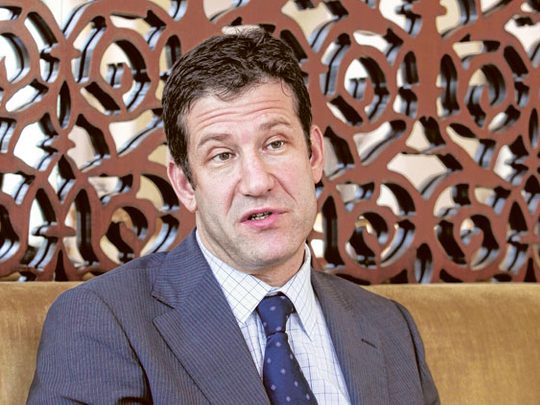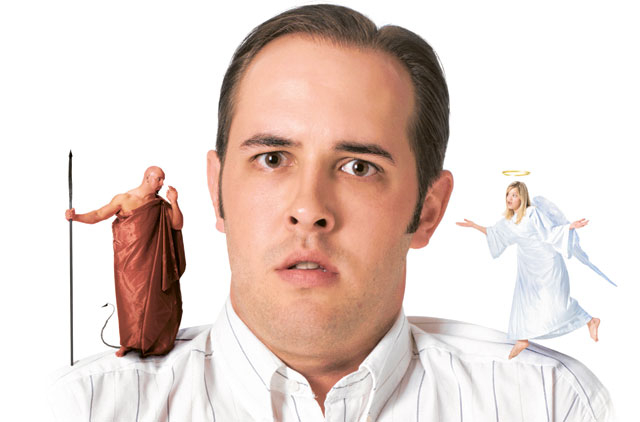
Dubai: The problem with the human brain is that it is built for a primitive era that does not exist anymore. In modern times we have to use brains that are geared toward survival and reproduction in a complex workplace environment.
It is no surprise that when we are faced with problems in a fast-paced modern workplace environment, we tend to go back to our default thinking and behavioural rules that got us out of trouble thousands of years ago, says Dr Lee Newman, a behavioural science expert at IE University in Spain. This biased and ‘dangerous' thinking can, over time, harm one's business and career.
Newman, who is the Dean of IE's School of Social and Behavioural Sciences, was recently in Dubai to share the latest findings on the behavioural bases of human judgment and decision-making in the workplace, which is his area of specialisation.
Newman describes a common scenario in the workplace: A team has to decide on a proposal and an idea has been put on the table. "Without realising it, managers often take that idea try to find information and analyses to prove their idea is good." Brainstorming confirms that idea and information that is sought tends to support the idea and is not critically viewed.
"This is what we call a ‘confirmation bias' and it is a slippery slope because you've chosen an idea that is biased but what about other possibilities? Shouldn't they have looked for data that goes against the idea as much as information for it? This is incomplete thinking."
In a diverse culture such as Dubai, the workplace is rife with biases, says Newman.
If, for example, a manager encounters someone from a different culture and they are not forthcoming with information, it is easy for the manager to view that person from his default biases based on his own culture and experiences.
‘Mindware'
"So if, in my culture, a person is not forthcoming, it is a sign of deception or dishonesty and the confirmation bias comes into play. The next step is I'm going to look for ideas to confirm that idea and I may find things, but it may not be real," explains Newman.
"In the past couple of decades there's been an explosion of research in behavioural science particularly in decision-making," says Newman. He describes the brain as having ‘mindware' — like a computer's hardware and software — which came from evolution at a time when the main goal was survival and reproduction.
Scientists have discovered that this mindware has led to a range of behavioural biases and it has a huge impact on the way we function in the workplace.
"Managers are making decisions every hour of the day, operating under pressure or with too much data or too little data and have to make quick decisions that have high impact. Under those conditions, when you don't have a lot of time, people tend to resort to default behaviours," explained Newman.
Default behaviour may work sometime, but will ultimately lead to errors of judgment he said. Unfortunately companies are not thinking about this enough and neither are educational institutions, he said.
Newman conducts programmes and courses for companies that realise the importance of decision-making. He also teaches courses to MBA, masters and undergraduate students.
Experiments
"First you have to make people aware of these biases and the best way to do it is present simply problems and tests that we have in psychology," he said.
Newman has developed a new technology that is a decision-making simulator, called IE Experiments. With participants he can replicate famous psychology experiments to show people they have biases.
"When we sit with senior managers, they give us answers to what they think are very simple reasoning questions but 90 per cent get it wrong."
‘Behavioural tweaks'
The next step is building awareness and the techniques to remain as unbiased as possible at work, which Newman refers to as ‘behavioural tweaks'.
Senior managers tend to have stronger biases than younger employees because they use experience, which is valuable, but tends to be inappropriate for new situations that require fresh thinking, says Newman.
These senior managers are taught to use Zen concepts or the ‘beginners mind' where they force themselves to put their knowledge aside temporarily and address the information on the table.
"Companies are asking for help because managerial judgment is critical to success and is a major part of leadership. They want managers to make more sound judgments and effective decisions."
"Quick decisions can add up to a career - the way you set up meeting, give feedback, motivate your team, engage with customers - and the way people make these decisions based on defaults can add up to success or failure," says Newman.
Decision-making traps to avoid:
- Emotion bias: As a manager when you have to lead change and get your team on board, you have to influence a group of people. Across the table there may be those who do not like the change and will resist you. Instead of allowing yourself to get angry or frustrated, try to judge the situation and think about it from the team member's point of view.
"Emotion is a sneaky influence on the process of judging situations so when emotions are taking over, that's when you need to exert cognitive control where you realise you are getting frustrated but you've got to keep an eye on the ball."
- Mental distance: If you are evaluating a product or business proposal, biases will come up. One approach is to develop ‘mental distance', which is the ability to remove yourself from getting caught up in the details of the situation and take a step back to broaden your perspective.
Reducing stress, taking breaks, being with nature are small but hugely beneficial steps you can take before making a big decision.
- Experience trap: As an employee or manager you have a hard drive with tonnes of experience and knowledge that you want to bring into a situation. Don't. This can cause trouble because the current situation is different than one from the past and "these days it's almost always true", says Newman. Avoid applying knowledge and experience that has no relevance.
- Tricks of memory: Newman refers to the ‘availability rule' which comes into play when managers are asked to think about, for example, the performance of an employee or how often a supplier delivered on time. "To figure it out, you go back into your memory, your hard drive, and this seems like a simple thing however memory is very biased."
Emotions influence the way things are stored in our minds. If a supplier was late only one time but did it during your best friends wedding and it required you to go to the office, it sticks in your mind. However, another supplier who was late five times but did not greatly inconvenience you will appear more efficient in your eyes.
- Similarity trap: If you had to evaluate a job applicant, you will have solid data in the form of their CV and you will also interview the person. "We have the hard evidence that's in the background but the data doesn't create a lot of emotion, it doesn't feel like something we can get our hands on, so when we have people in front of us it feels more ‘real' and more tangible," says Newman.
People tend to make decisions based on similarities — the job applicant may remind you of a former colleague, or come from the same country as you. Chemistry is important, but how well a person matches something you've seen in the past may not be the best deciding factor.








